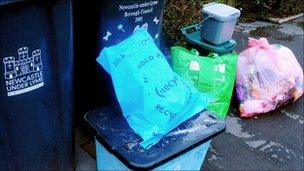'People are being given too many recycling bins'
- Published
- comments

Two councils managed with just one bin, the survey said
Councils are asking householders to sort their rubbish into as many as nine types to boost recycling, a survey suggests.
On average, the Taxpayers' Alliance pressure group found councils expected residents to sort their household waste into four separate types.
Newcastle-under-Lyme had the largest number, with nine bins, bags and boxes.
The government said this number "seemed a little over the top" and it was reviewing waste collection.
The research was compiled, external through a combination of freedom of information requests and checking council websites.
Newcastle-under-Lyme uses separate containers and bags for refuse, cardboard, plastics, paper, glass and cans, textiles and garden waste.
It also hands out two food waste caddies - one for putting food scraps in for the kitchen and another for kerbside collection.
But Trevor Nicoll, head of recycling and fleet services at Newcastle-under-Lyme Borough Council, said they had launched an improved recycling and waste service and saved £500,000.
"Residents choose to what extent they recycle, if at all, but they have embraced it as rates have shot up from 27% to 50%," he said.
On Thursday the council won the Waste Management Award at the Government Business Awards.
The survey also found 20 other local authorities including Chelmsford, Aberdeenshire, Guildford and Middlesbrough give residents seven or more containers.
'Hugely popular'
Two councils - Dumfries and Galloway and the Isles of Scilly - collect just one bin.
Across England, around 40% of household waste is now being recycled, composted or reused.
Councils face taxes for using landfill to deal with waste and fines if European Union targets to reduce the amount of rubbish sent to landfill are not met.
Chris Daniel, policy analyst at the Taxpayers' Alliance, said: "Having to sort rubbish into numerous bins often frustrates taxpayers, even if they want to recycle.
"It's ridiculous that some councils ask for waste to be sorted into seven bins or more. This places needless pressure on households and isn't a good way of encouraging recycling."
But Friends of the Earth's waste campaigner, Julian Kirby, said recycling was hugely popular, with over 80% of households satisfied with their waste and recycling service.
"While some people are frustrated by complicated sorting systems, the Taxpayers' Alliance are missing the point - we don't need lots of bins to have a good recycling service," he said.
"In the simplest, cheapest and most effective services, the binmen sort recyclables from one or two bins into multi-compartment trucks so householders don't have to."
Gary Porter, chairman of the Local Government Association environment board, said there was no "one-size-fits-all solution" when it came to bins.
"The infrastructure for dealing with waste differs across the country, so do the types of homes people live in.
"What works in inner-city London won't necessarily work in rural areas. This means that bin collections will inevitably be different across the country."
A spokeswoman for the Department for Environment, Food and Rural Affairs, said: "We want to make it as easy as possible to recycle, but nine separate bins seems over the top.
"As part of the waste review, we're looking at how we can better support authorities to provide the kind of waste services local residents want, while increasing our household recycling rates."
- Published13 January 2011